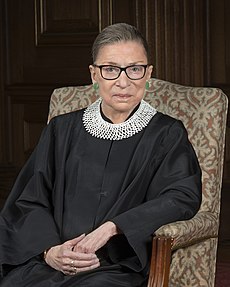Ruth Bader Ginsburg’s Complex Legacy
Why didn’t Ruth Bader Ginsburg resign during President Obama’s tenure?

Ruth Bader Ginsburg (RBG) wearing one of her many famous collars made out of beads from South Africa. RBG was known as a trendsetter in Supreme Court fashion as she wore unique collars with her classic black robe.
As a kid, I was never very interested in sports, so my idols were not the classic Peyton Manning or Simone Biles. Instead, I looked up to Ruth Bader Ginsburg (RBG). In my house, like many others, she was treated as a representation of feminist excellence, a god-like figure to admire. I was told if I worked as hard as possible, I could one day have an impact like RBG.
As I’ve grown older, politics have become less black and white to me, and significantly more important. The last few years of politics have been a scary, disheartening time. From the COVID-19 pandemic to the January 6th insurrection, the idealist goals of my youth have certainly faded. The issue of RBG resigning has been a point of contention since 1999 when she was diagnosed with colon cancer at 66. Following this she was diagnosed with cancer five times until she died of complications of pancreatic cancer in 2020. Many were worried that RBG would pass while a conservative president was in office, as she did, and therefore wanted her to resign during Obama’s presidency.
While it can never exactly be known why RBG didn’t resign while Obama was in office, there are a few likely reasons. First, the resignation of Sandra Day O’Connor in 2005, when she was 75, may have served as a cautionary tale for RBG. O’Connor resigned to spend more time with her husband who had been diagnosed with Alzheimer’s, unfortunately, right after she left the bench her husband’s disease progressed to the point he could no longer recognize her. O’ Connor says that resigning was “the dumbest thing I ever did.”
Second, RBG had built her trailblazing career on denying other’s opinions, so she may have not wanted to surrender to other people’s requests for her resignation. Moreover, men were a large portion of those asking for her resignation, and she may have wanted to stand up to them. Margaret McKeown, friend of RBG and judge on the ninth circuit of appeals, said,“The impression I got from her was that it was presumptuous for someone else to decide how and when you should end your judicial career.”
Third, calls for her resignation started to rise in 2014 while Obama was in office and there was a democratic senate majority. At this point though, RBG was at the height of career, she was the senior member of the liberal bloc of the court. She also gained significant influence after becoming somewhat of a meme, the Notorious RBG. The nickname started when a Tumblr page was made in 2013 to celebrate RBG’s liberal court decisions. Since then, t-shirts, buttons, stickers, Halloween costumes, mints, and other types of RBG themed memorabilia have populated the market. She had a new platform of millennial fans.
The fourth, and probably most likely reason RBG did not resign while Obama was in office is that she did not foresee being replaced by a conservative president. Jane Ginsburg, RBG’s daughter, told The New York Times that “I think that Mother, like many others, expected that Hillary Clinton would win the nomination and the presidency, and she wanted the first female president to name her successor.” RBG’s idealism is a hallmark of belief system, usually one of her positive attributes as it helped her see a better path for women was possible. However, in this situation, RBGs idealist future was simply imaginary and resulted in a likely forty years of a very conservative justice on the court, as Barrett is only 50 years old. Now, the then called pessimists begging for RBGs resignation have been renamed realists.
A common response to those who say she should have resigned before her death is that Obama would not have been able to get a suitable nomination through the senate. Merrick Garland, a much more moderate appointee than would be expected of an RBG replacement couldn’t get through in 2016. RBG agreed with this and told Elle in 2014 “anybody who thinks that if I step down, Obama could appoint someone like me, they’re misguided.” This argument falls a bit flat though, considering that in 2016 the Republicans held the senate, resulting in Obama’s supreme court appointee being blocked. A democratic president hadn’t nominated a supreme court justice while the Republicans held the senate since 1895. So, Obama likely would not have been able to choose RBG’s replacement in 2016. That, however, does not explain the seven year period from 2008 to 2015 when Obama would have been able to choose her replacement with a democratic senate majority.
While it can never exactly be known why RBG didn’t resign while Obama was in office, there are a few likely reasons.

Kate Hankin is an Editor-in-Chief for ‘The Science Survey.’ In her journalistic writing, Kate likes to share her interests such as food, music, current...
